How Peter Dutton's heartland lost him Australia's election
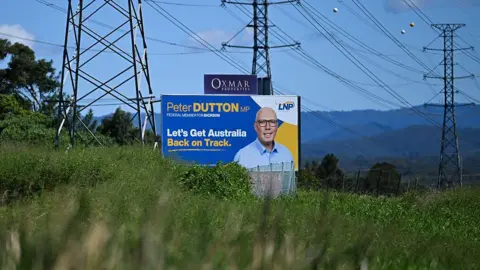 Getty Images
Getty ImagesFor the past three years, when peers of Australia's former Liberal Party leader Peter Dutton were grilled over his divisive persona, they'd often profess his celebrity status in the north.
"Peter is one of us… He's very popular in Queensland," said the leader of the Nationals, the Liberal's coalition partner, earlier this year.
But on election night, it was Dutton's home state that delivered Labor its election win, with the red landslide ousting the veteran MP from his own seat of Dickson.
While votes are still being counted, Labor could pick up as many electorates in Queensland as it did across every other state and territory combined.
And that's thanks, in no small part, to a new bloc of young voters and women who are disillusioned with the Coalition, and attribute the party's emphatic loss to the "Dutton effect".
As 65-year-old coalition voter Sue, who didn't share her last name, bluntly puts it: "This is where [Dutton's] from… People know him and they don't like him."
Losing the heartland
The Moreton Bay region, about an hour north of Brisbane, is supposed to be Dutton heartland. Before Australia's federal election on 3 May, all three seats here were Liberal-held - though only by small leads, with Dutton's electorate of Dickson having the narrowest in the state.
Dutton's family have deep roots here, with his dairy farming great-grandparents having settled in the area in the 1860s.
When he first entered parliament 24 years ago, the region was made up of urban pockets and industrial estates surrounded by swathes of semi-rural land. Not quite metropolitan or rural, is how the former police officer described it in his maiden speech as MP.
Now Brisbane is one of the fastest growing cities in Australia, and these outer northern suburbs are one of the main places it is squeezing people in. Residential development has exploded, and more families, priced out of locations closer to the city, have moved in to Moreton Bay.
Full of the "quiet Australians" Dutton said would deliver him the election, outer-suburban neighbourhoods like these were at the heart of the Coalition's strategy.
The average household in Moreton Bay earns less than both the state and national average, with many of them relying on the health, trade and hospitality sectors for work. The Coalition hoped promises to cut fuel expenses, improve housing affordability and back small businesses would woo voters concerned about the cost of living.
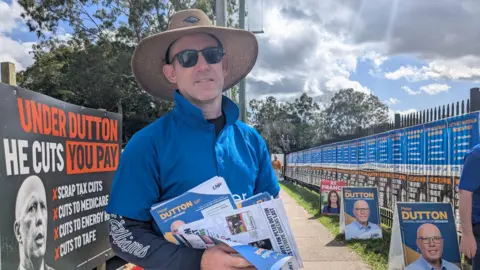
Many Moreton Bay residents, like campaign volunteer Kenneth King, also felt Dutton's links to the area would give them a boost.
"I've known Peter Dutton for a lot of years," the Dickson local told the BBC on polling day. "He's always been someone of high character, serious about effective policies and a lot of empathy for ordinary Australians."
"He's very well respected in the community… People know him."
But there's a difference between being well known and well liked, says Aleysha, a swing voter in the neighbouring electorate of Petrie, who declined to give her surname.
"I don't know whether he appeals to the everyday person," the 26-year-old nurse says. "He doesn't put himself in the people's shoes."
Her vote over the years has gone to a range of parties from right across the political spectrum – except the Greens, she adds with a quick laugh.
"I don't sit with any party. Being a Christian, it's whatever party aligns closest to my values," she says, adding that the future of her two young children is the other major consideration.
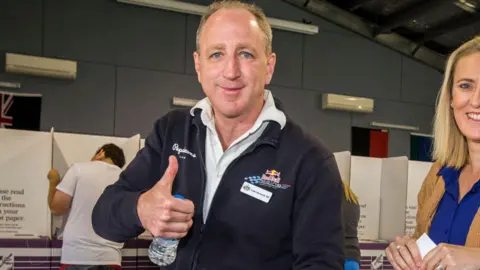 Getty Images
Getty ImagesThis election, that meant her vote went to Coalition incumbent Luke Howarth, who she knows personally from her church.
But while she's praying for a miracle, with the final votes still being counted, she's not surprised to find Howarth may be on his way out.
She says Labor ran very visible campaigns in the area, but tells the BBC that it was driving past the image of Howarth and his leader on billboards which stuck in her mind.
"Unfortunately I think that's what did it," she says.
"Peter Dutton's face behind him was a huge turnoff - for me personally too."
Sue, who lives in the same electorate and is generally a conservative voter, says this election she was torn at the ballot box.
"I had a huge hesitation over it," she says. "I don't like Albanese; I think he's like, weak.
"[But] Dutton's an unattractive personality... He thinks he's presenting himself as strong, but he presents himself as a bit of a bully."
"Way back when, he seemed like a really good local member, but as he climbed the ladder, I don't know, something changed."
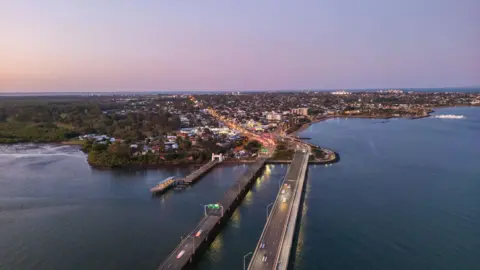 Getty Images
Getty ImagesUltimately Sue also voted for Howarth - and she's similarly convinced Dutton lost him the seat.
"I spoke to a few friends… some did change their votes because of Peter Dutton," she says. "People, rightly or wrongly, aligned Dutton with Trump. And that's very negative for just about any sane person."
Many of the constituents the BBC spoke to stressed they did not want American style politics here.
Drew Cutler grew up in the seat of Longman, which shares borders with both Dickson and Petrie - and though he no longer lives in the area, the 28-year-old was so invested in the outcome he came back to campaign for Labor.
Won by Coalition MP Terry Young on a margin of 3% last election, it is now too close to call.
Mr Cutler, a former Labor party staffer, believes Labor ran very strong local campaigns. But he also thinks Dutton's policy flip-flopping and the aura of instability that projected was potent.
That included announcing, and then walking back, public service job cuts and plans to end work-from-home arrangements, as well as a fluctuating stance on electric vehicle taxes.
Such optics were especially damaging, Mr Cutler argues, when contrasted with the image of strong, decisive leadership Dutton tries to convey.
"I almost think the Australian people would have respected him more if he stuck to it… and said, 'This is what I'm putting forward - if you don't like it, don't vote for it'," Mr Cutler tells the BBC.
Back in Dickson, Rick - a retiree and fresh Liberal Party member - said on election night that he also felt confusion played a role in the party's defeat, particularly among young people.
"I think people couldn't understand Dutton's policies," he said.
But 30-year-old April, who didn't provide her last name, says it is Dutton who didn't understand.
She can't remember a time when he wasn't in power in Dickson, and feels that over time he has lost touch with his own constituents and the country more broadly.
For her, the last straw was his instrumental role in the defeat of the Voice to Parliament referendum, which sought to recognise Aboriginal and Torres Strait Islander people in the constitution and simultaneously establish a parliamentary advisory body for them.
"I think he has caused a lot of harm to a lot of minority groups across the scale," she says.
For others in the electorate though, the last straw was watching Dutton fly to a fundraiser in Sydney as the area in and around Dickson was hit by Cyclone Alfred in February.
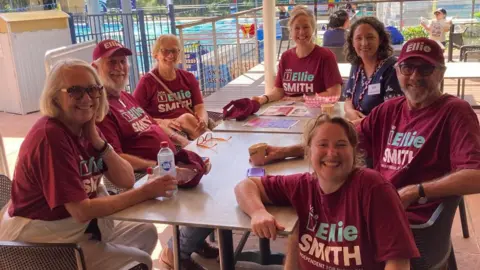 Supplied
SuppliedApril didn't feel like Labor Party's offering was strong either, especially on climate action, so she decided to campaign for Ellie Smith, the so-called 'teal' independent running in the seat.
Disappointment - borderline embarrassment - that Dutton was from her local area had crystallised into determination: "I felt like it was a duty in a way… our responsibility to get him out."
Ultimately, the Coalition lost at least six seats to Labor in Queensland – all bar one in Brisbane. And while they are a few votes ahead in Longman as the count continues, they could still lose that too.
Wildcard Queensland
Queensland has long been a bit of a political wildcard, and often finds itself in the "spotlight" at federal elections, says Frank Mols.
The University of Queensland politics lecturer points out the state helped deliver Kevin Rudd's historic election win in 2007 and Scott Morrison's "miracle" victory in 2019. Last election, as a record number of people across the nation voted for candidates outside the two major parties, Queensland surprised the nation by giving the Greens three seats - up from none.
There are a couple of factors that make the state more "volatile" and likely to deliver upsets, Dr Mols says.
Firstly, it is the only state or territory, except for the island of Tasmania, where more than half of the population live outside the capital city of Brisbane.
"We talk about Queensland always being two elections, one in the south-east corner, and then the rest - and they often get very different patterns."
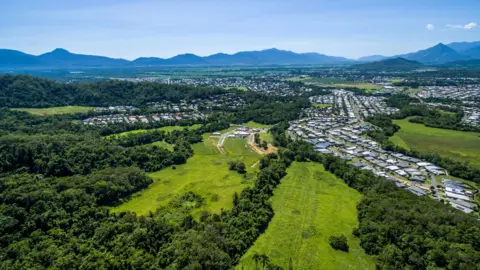 Getty Images
Getty ImagesThere's also more political fragmentation in the state, Dr Mols says, which combined with Australia's preferential voting system can make political equations here tighter, and trends harder to predict.
But he – like many of the voters the BBC spoke to – largely puts last weekend's surprise for the Coalition down to Dutton and his broadly-criticised campaign performance.
While there's a tendency to attribute success or failure to policy issues, more often its really about voters' emotional response to candidates and leaders, Dr Mols says.
"If you do the barbecue test, is Dutton a person you would walk up to? Is he somebody you would warm to or gravitate towards?
"You can wonder: was Peter Dutton, in hindsight, the Labor Party's best asset?"
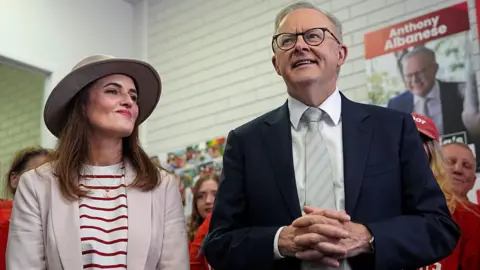 Getty Images
Getty ImagesBut Dutton may have had the opposite effect for the Greens Party, which has lost at least two of the three seats it gained in Brisbane in 2022. Their party leader, Adam Bandt, also appears to have been defeated in Melbourne, an electorate he'd held for 15 years.
"Perhaps in desperation, [Dutton] was gravitating towards culture war issues, sort of echoing Trumpian themes, if you like, and that has been punished," Dr Mols says. "But also the Greens… who were perhaps seen as being at the other end of that shouting match, have not done well."
Dr Mols also believes that desperation to keep Dutton out may have seen some former Greens voters prioritise Labor this time - though he points out more centrist Teal independents appear to have bucked that trend.
In any case, he doesn't see the result in Queensland as a groundswell of love for Labor. The state was still the only jurisdiction in Australia where there were more first preference votes for the Coalition than Labor.
"There has to be enough of a swing towards a party, but it's often that preferencing that actually tilts it over the line," he says.
"This is more of a Liberal loss."
For many Coalition voters, that loss is deeply felt. Rick describes it as a "real rout".
But among others, like Aleysha, there is an inexplicable element of mirth.
"I think it's quite funny, that he slipped as much as he did," she says. "And I can't tell you why."
Additional reporting by Kelly Ng.
